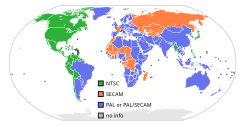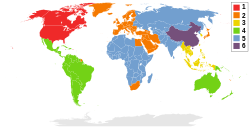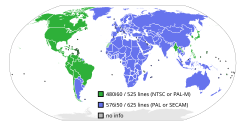NTSC-C is a regional lockout created in 2003 by Sony Computer Entertainment for the official launch of its PlayStation 2 gaming system into the mainland...
5 KB (616 words) - 13:54, 30 April 2025
NTSC (from National Television System Committee) is the first American standard for analog television, published and adopted in 1941. In 1961, it was assigned...
90 KB (10,408 words) - 07:52, 24 June 2025
NTSC-J or "System J" is the informal designation for the analogue television standard used in Japan. The system is based on the US NTSC (NTSC-M) standard...
11 KB (1,276 words) - 14:51, 26 April 2025
Regional lockout (redirect from NTSC-U/C)
regions are: Japan and Asia (NTSC-J) Americas (NTSC-U) Europe, Oceania, Middle East, India, South Africa (PAL) China (NTSC-C) The Atari 2600 does not have...
59 KB (6,965 words) - 13:33, 27 June 2025
NTSC signals, and 21.39 meters per second for PAL signals. As for linear tape speeds, type C VTRs could run at 24.4 centimeters per second for NTSC,...
12 KB (1,368 words) - 17:20, 5 May 2025
PAL (section PAL vs. NTSC)
one of three major analogue colour television standards, the others being NTSC and SECAM. In most countries it was broadcast at 625 lines, 50 fields (25 frames)...
65 KB (6,770 words) - 19:23, 4 June 2025
white balance in a wide variety of lighting situations. However, in NTSC-J and NTSC-C standards, 9300 K color temperature is recommended. TVs and projectors...
32 KB (3,611 words) - 15:45, 16 June 2025
YIQ (section FCC NTSC Standard (SMPTE C))
YIQ is the color space used by the analog NTSC color TV system. I stands for in-phase, while Q stands for quadrature, referring to the components used...
12 KB (1,821 words) - 09:23, 12 February 2025
DVD region code (section PAL/SECAM vs. NTSC)
in that particular region, such as NTSC and PAL, although from the early 1990s PAL machines increasingly offered NTSC playback. DVDs are less restricted...
30 KB (3,608 words) - 01:42, 24 June 2025
Standard-definition television (section PAL and NTSC)
4:3 or 16:9 image. For SMPTE 259M-C compliance, an SDTV broadcast image is scaled to 720 pixels wide for every 480 NTSC (or 576 PAL) lines of the image...
8 KB (766 words) - 12:40, 1 July 2025
VHS (section VHS-C / Super VHS-C)
(VHS-C), originally developed for portable VCRs in 1982, but ultimately finding success in palm-sized camcorders. The longest tape available for NTSC holds...
97 KB (11,232 words) - 01:43, 24 June 2025
SECAM (section Comparison to PAL and NTSC)
three major analog color television standards, the others being PAL and NTSC. Like PAL, a SECAM picture is also made up of 625 interlaced lines and is...
43 KB (5,057 words) - 17:26, 1 July 2025
audio to videotape as Beta Hi-Fi. For NTSC, Beta HiFi worked by placing a pair of FM carriers between the chroma (C) and luminance (Y) carriers, a process...
40 KB (4,397 words) - 16:13, 11 June 2025
SMPTE timecode (redirect from NTSC timecode)
timecode originates from a compromise introduced when color NTSC video was invented. The NTSC designers wanted to retain compatibility with existing monochrome...
13 KB (1,852 words) - 02:40, 22 June 2025
carries the color information (C), a combination of hue and saturation. Details of the combining process vary between the NTSC, PAL and SECAM systems. The...
16 KB (1,638 words) - 15:53, 11 June 2025
include luminance (Y) and chrominance (C). When combined into one channel, as is the case among others with NTSC, PAL, and SECAM, it is called composite...
35 KB (3,705 words) - 08:15, 30 June 2025
VHS-C is a compact version of the VHS videocassette format, introduced by Victor Company of Japan (JVC) in 1982, and used primarily in consumer-grade...
8 KB (970 words) - 05:34, 5 May 2025
and usually paired with NTSC color. This association explains why 480i is sometimes inaccurately called "NTSC", even though NTSC only exists in the analog...
7 KB (825 words) - 19:09, 2 March 2025
Color television (section Second NTSC)
developed, finally resulting in the NTSC color standard that was compatible with the prior monochrome system. Although the NTSC color standard was proclaimed...
88 KB (11,548 words) - 22:25, 1 June 2025
(A-N) in combination with the color standard used (NTSC, PAL or SECAM) - for example PAL-B, NTSC-M, etc.). These analog systems for TV broadcasting dominated...
47 KB (5,138 words) - 17:13, 26 April 2025
the NTSC was that they were unable to determine the cause of the crash and was thus inconclusive. On the other hand, in a letter sent to the NTSC, the...
39 KB (4,247 words) - 07:32, 27 June 2025
CCIR System M (section NTSC-M and NTSC-J)
CCIR System M, sometimes called 525–line, NTSC, NTSC-M, or CCIR-M, is the analog broadcast television system approved by the FCC (upon recommendation by...
11 KB (1,019 words) - 23:26, 8 May 2025
intended for a Xilinx FPGA) and enhanced it for the C-One. This core supported both PAL and NTSC machine emulation, and aimed to be cycle-exact and emulate...
4 KB (498 words) - 03:54, 21 January 2025
Another method of importing is using a region-free disk drive. PAL NTSC-C NTSC-J NTSC-U/C Multicart While the 3DO does not feature regional lockout, a few...
18 KB (2,599 words) - 01:54, 8 June 2025
(using very nearly the NTSC color subcarrier frequency), unlike all other countries which pair PAL with 625-line systems and NTSC with 525-line systems...
10 KB (1,089 words) - 14:52, 26 April 2025
Apollo 11 missing tapes (section NTSC broadcast tapes)
NTSC television format. The moonwalk's converted video signal was broadcast live around the world on July 21, 1969 (2:56 UTC). At the time, the NTSC broadcast...
36 KB (3,622 words) - 18:53, 16 March 2025
from 1,800 to 600 rpm for NTSC, and 2,470 to 935 rpm for Hi-Vision. This allowed up to 60 minutes of video per side for NTSC and Hi-Vision formats (64...
81 KB (10,686 words) - 00:30, 1 July 2025
Philips circle pattern (section NTSC)
in the SECAM system. Likewise, there are 525-lines NTSC versions of the pattern. One of the NTSC variants, used in Philippines, Taiwan, Haiti and Japan...
79 KB (8,379 words) - 08:43, 21 March 2025
encoded audio/video on a standard NTSC Video8 cassette, the tape must be run at double the Hi8 speed. Thus, a 120-minute NTSC Hi8 tape yields 60 minutes of...
25 KB (2,956 words) - 05:50, 29 April 2025




















